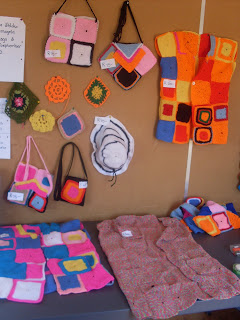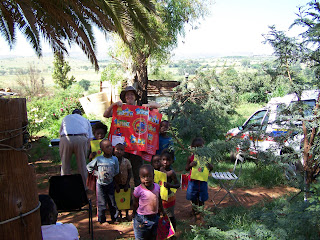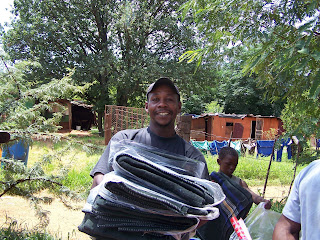Village Power CDP, in partnership with the Masakhane Community have launched a Participatory Research Project. Participatory research means that the community members receive training in research methods and that they are part of the research on every level. This helps communities take ownership of their situation and actively participate in the decision-making processess affecting them.
Progress on this project will be posted on the blog regularly
HOW will the research be conducted?
Training of a local team (consisting of members of the community) in participatory techniques will enhance the ability of the community to participate in present and future research which might be needed for the community. The training of members of the community in research participation also empowers the community with the necessary knowledge needed about aspects of development so that outside developers can be monitored and held accountable for any plans they might implement. Because the PRA approach empowers the community to become partners in their own development, they can take ownership of the process instead of being the object of development. This strategy improves the sustainability of any development project.
WHO will be involved in the research?
·
Research facilitators – will act as convenors and catalysts without dominating the process.
· Community members including community leaders and people from households affected by HIV/AIDS will be actively involved in every aspect of the research project. Before research commences all stakeholders need to be informed of and invited to take part in the research process. Consent and support for the research project needs to be obtained and as much information as possible given to everyone involved. Aims and objectives, methods and instruments, analysis methods and possible projects which might evolve from the research need to be transmitted to every stakeholder in a clear and transparent way. Every person concerned will have the opportunity to voice their opinions and possible concerns regarding the research project and issues which could arise from it. The community will carry out the analysis and decide what is ultimately to be done with the information and analysis which they will generate.
What needs to be done and why?
The Research Project will employ the methods used in the Participatory Research Approach model. This approach involves a combination of methods which enable people to be involved in assessing and expressing aspects of their every-day situations. Being actively involved in research on any aspect affecting them empowers people to be able to plan themselves what needs to be done and how this action is to be monitored and evaluated.
The PRA method aims at getting maximum involvement from all stakeholders. Through active involvement of the community any research, present or future can be sustainable.
What Methods will be used in this research?
The methods used in this research will aim to enable people to express and share information and many will be created by local people themselves. Because HIV/AIDS is such a disempowering condition, it is imperative to get the people affected by it involved in the identification and prioritisation of the main problems they encounter.
Some of the PRA methods proposed for this research are:
· Maps showing who lives where, (e.g. who heads the household, which households are affected by HIV/AIDS) and where resources such as water, schools, clinics etc. are situated.
· Flow diagrams which will show linkages, sequences, causes, effects, problems and solutions. The impact of e.g. poverty, employment, school attendance, economic status etc.
· Seasonal calendars showing how food availability, family health and other factors connected and vary during the year (e.g. do people tend to get sick more in winter when food is not readily available).
· Transect walks and mapping of the information gained on transect walks by the participating members of the community.
Time table
The first thing to be done is to get all the stakeholders involved in the planning of the project. A time needs to be established which suits everyone for the proposed project to be suggested to the community and other stakeholders. Enough time should be allowed for all concerned to be able to respond to the proposed project before the actual research takes place.
Time also needs to be set aside for the proper training of the interested members of the community as research facilitators. It is important that the participants are all familiar with the principles of PRA methods and with the aims and objectives of the research study.
The time table for this research will be drawn up jointly by the participants from the community and the researcher taking into consideration what times would best suit the community members’ involvement without imposing on their schedules regarding the collection of water and fire wood or household chores such as cooking and washing.
Poverty assessment
Because poverty is a major issue affecting rural households this aspect will be a focus point in the research process. Information will be obtained employing the following proposed methods about the target groups and major issues listed below:
·
Female-headed household – Including women from female headed households in the group to be trained in PRA research methods. This will serve to involve these women in the assessment of the situation and to empower them to become actively involved in the processes affecting them. Women are traditionally excluded from power structures and the inclusion of women who head households in this research process could equip them with valuable skills which could be applied to the development processes of the community in future as well as give them a ‘voice’ within the community.
·
Orphans and vulnerable children – Identify these through involving members of the community in discussion groups, transect walks etc.
· Child-headed households – Involve the children heading the household in the PRA activities such as transect walks and informal discussions and drawing up new maps with proposed changes and plans for development.
·
Young unemployed household members – Through their involvement in discussions and other PRA activities.
·
Child labourers – Focus group discussions at a time at which they are not working, encouraging these children and their parents to access the sustainability of child labour and to examine possible alternative ways of generating an income for the families.
·
Distance to health a nd water supply facilities
nd water supply facilities – Transect walk and mapping activities.
·
Learning needs for out of school youth and adults – Focus group discussions during which this group is encouraged to identify their own learning needs and to prioritise these needs.


 The four trainee teachers at the creche each took a turn to welcome the group and to express their gratitude at the change which the edutainers have made to the lives of the mothers and children of Masakhane.
The four trainee teachers at the creche each took a turn to welcome the group and to express their gratitude at the change which the edutainers have made to the lives of the mothers and children of Masakhane. Each visitor was given a hand-printed T-Shirt which had been decorated by the creche children helped by the teachers and Standford Sambo, a young father from the community.
Each visitor was given a hand-printed T-Shirt which had been decorated by the creche children helped by the teachers and Standford Sambo, a young father from the community. 




















 nd water supply facilities – Transect walk and mapping activities.
nd water supply facilities – Transect walk and mapping activities.
